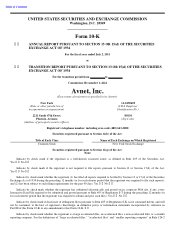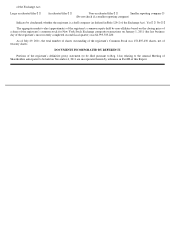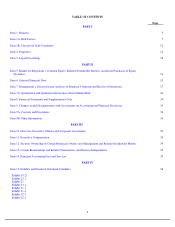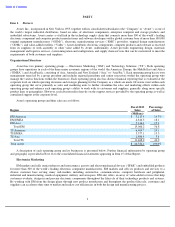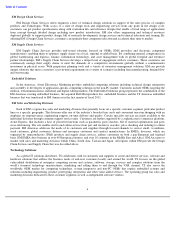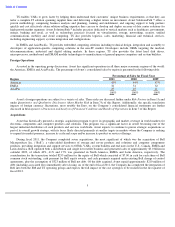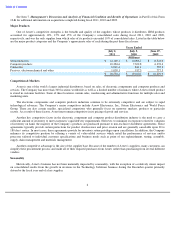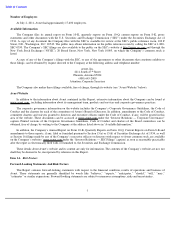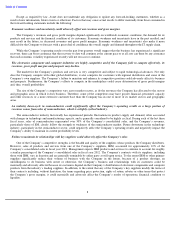Avnet 2011 Annual Report Download - page 13
Download and view the complete annual report
Please find page 13 of the 2011 Avnet annual report below. You can navigate through the pages in the report by either clicking on the pages listed below, or by using the keyword search tool below to find specific information within the annual report.
Table of Contents
The potential criminal penalties for violations of export regulations and anti-corruption laws, particularly anti-
bribery, data
privacy laws and environmental laws and regulations in many jurisdictions, create heightened risks for the Company’
s international
operations. In the event that a governing regulatory body determined that the Company had violated applicable export regulations or
anti-
corruption laws, the Company could be fined significant sums, incur sizable legal defense costs and/or its export capabilities
could be restricted, which could have a material and adverse effect on the Company’
s business. While the Company has and will
continue to adopt measures designed to ensure compliance with these laws, the Company cannot be assured that such measures will be
adequate or that its business will not be materially and adversely impacted in the event of an alleged violation.
The Company’s acquisition strategy may not produce the expected benefits, which may adversely affect the Company’
s results of
operations.
Avnet historically has pursued a strategic acquisition program to grow its global business for electronic and computer products,
thereby enabling Avnet to solidify and maintain its leadership position in the marketplace. Acquisitions involve risks and uncertainties
such as expansion into new geographic markets and business areas and diversion of management’
s attention from existing business
operations. In addition, the Company may not be successful in integrating the acquired businesses or the integration may be more
difficult, costly or time-
consuming than anticipated. Consequently, the Company may experience disruptions that could, depending on
the size of the acquisition, have a material adverse effect on its business, especially where an acquisition target may have pre-
existing
non-compliance or pre-
existing deficiencies or material weaknesses as those terms are defined under relevant SEC rules and
regulations. Furthermore, the Company may not realize all of the anticipated benefits from its acquisitions, which could materially and
adversely affect the Company’s financial performance.
If the Company fails to maintain effective internal controls, it may not be able to report its financial results accurately or timely
or detect fraud, which could have a material adverse effect on the Company’s business or stock price.
Effective internal controls are necessary for the Company to provide reasonable assurance with respect to its financial reports
and to effectively prevent fraud. If the Company cannot provide reasonable assurance with respect to its financial reports and
effectively prevent fraud, its brand and operating results could be harmed. Pursuant to the Sarbanes-
Oxley Act of 2002, the Company
is required to furnish a report by management on internal control over financial reporting, including management’
s assessment of the
effectiveness of such control. Internal control over financial reporting may not prevent or detect misstatements because of its inherent
limitations, including the possibility of human error, the circumvention or overriding of controls, or fraud. Therefore, even effective
internal controls cannot provide absolute assurance with respect to the preparation and fair presentation of financial statements. In
addition, projections of any evaluation of effectiveness of internal control over financial reporting to future periods are subject to the
risk that the control may become inadequate because of changes in conditions, or that the degree of compliance with the policies or
procedures may deteriorate. If the Company fails to maintain the adequacy of its internal controls, including any failure to implement
required new or improved controls, or if the Company experiences difficulties in their implementation, the Company’
s business and
operating results could be harmed, and the Company could fail to meet its reporting obligations, which could have a material adverse
effect on its business and the market price of the Company’s securities.
If the Company’
s internal information systems fail to function properly, or if the Company is unsuccessful in the integration or
upgrade of information systems, its business operations could suffer.
The Company’s expanding operations put increasing pressure on the Company’
s information systems to produce timely, accurate
and reliable reports on financial and operational results. Currently, the Company’
s global operations are tracked with multiple
information systems, some of which are subject to on-
going IT projects designed to streamline or optimize its global information
systems. There is no guarantee that the Company will be successful at all times in these efforts or that there will not be integration
difficulties that will adversely affect the Company’
s operations or the accurate and timely recording and reporting of financial data. In
addition, these systems are subject to computer hacking or other general system failure. Maintaining and operating these systems
requires continuous investments. Failure of any of these information systems or material difficulties in upgrading these information
systems could have material adverse effects on the Company’
s business and its compliance with reporting obligations under federal
securities laws.
10


